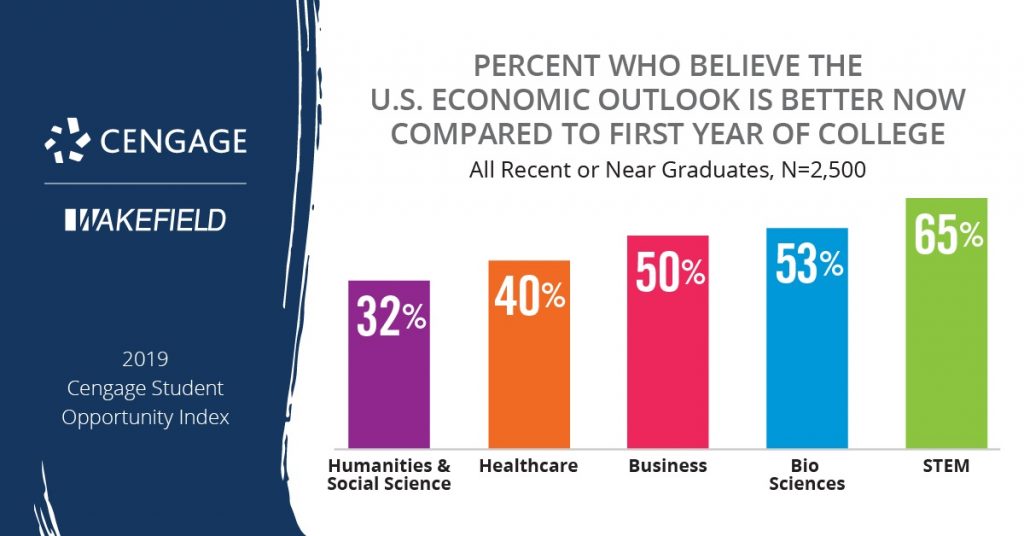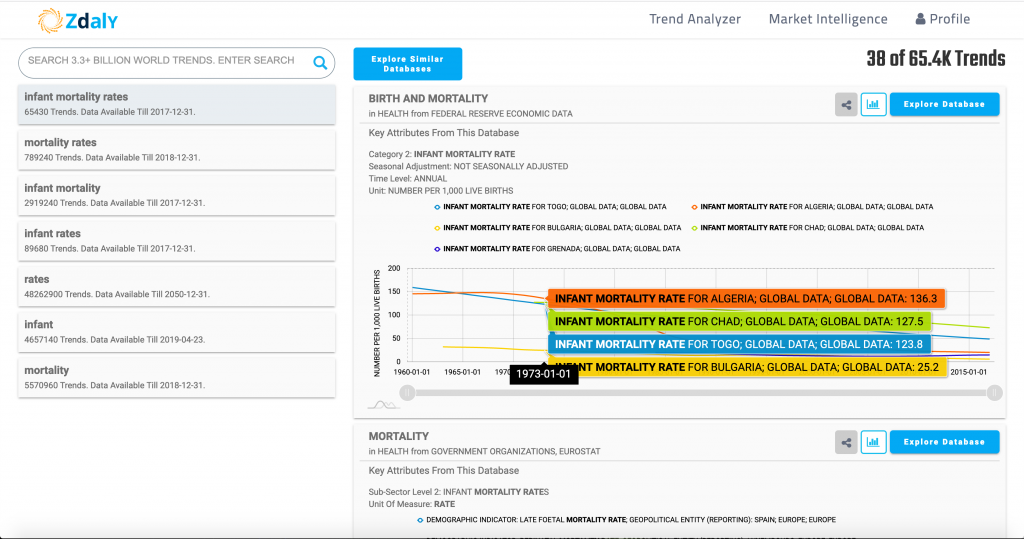Cengage Student Opportunity Index Measures Outlook by College Major

BOSTON—July 18, 2019 — This month, incoming college freshman will tackle their first on-campus experience: orientation. As students register for classes and contemplate majors, data from the Cengage Student Opportunity Index sheds light on how recent and upcoming graduates are faring. According to the Index, graduates in business and hard sciences (STEM, Healthcare and Biosciences) are bullish about their job opportunities and economic outlook, while humanities & social sciences majors are less optimistic about their futures.
“It’s important that students understand how the decisions they make now may impact their lives long after graduation, such as how much debt to take on and job prospects. While the Index shows Humanities majors feel more uncertainty about their futures than other majors, the liberal arts cultivates skills like critical thinking and effective communication. These soft skills or uniquely human skills are key to workplace success, and graduates who demonstrate strength in this area will have an advantage,” said Michael E. Hansen, CEO of Cengage.
The Cengage Student Opportunity Index measured the opportunity environment for graduates across 17 indicators, using existing public data and a survey of 2,500 recent and upcoming graduates.
Here are the key findings across college majors:
• Employment Outlook: Upcoming graduates are confident they will land a job fairly quickly after graduating, though some majors are more positive than others.
• Business students are the most confident they will land a job in their field (97 percent); while Humanities & Social Sciences students are the least confident (86 percent), however the majority of students in both fields are confident in their job prospects.
• Healthcare graduates are the most likely to be working in their field of study (69 percent); while less than half of Humanities & Social Sciences graduates are working in their field (46 percent).
• Healthcare and STEM majors (both 92 percent) are most likely to say jobs in their field will increase in the next two years.
• Job Considerations: Non-financial job priorities vary by major but doing work that makes a difference seems to come at the expense of growth opportunities for working recent and upcoming graduates.
• Business majors are more likely to have a job that offers work-life balance and growth opportunities than one that makes a difference in peoples’ lives.
• Healthcare and Humanities & Social Sciences majors are more likely to work in a job they feel is making a difference, but are least likely to have a job with growth opportunities.
• Three-quarters of STEM majors (75 percent) are confident they will meet their salary expectations compared to half of Humanities & Social Sciences majors (51 percent) .
• Debt: While student loan debt is on the rise, some majors are less impacted than others.
• Healthcare majors are most likely to have no debt (63 percent).
• Biosciences majors are more likely to owe higher amounts of debt (more than $30,000).
• Less than half of Humanities majors (44 percent) said they would graduate with debt, and those with debt are the most realistic about how long they expect it will take to pay it off– 8 years, though that is still lower than federal estimates.
• Future Outlook: Most graduates are optimistic about their future, but some majors are uncertain about the future of the country.
• Humanities & Social Sciences majors have the most negative outlook – only half (51 percent) think they will be better off than their parents;
• Only 32 percent of Humanities & Social Science majors think the U.S. economic outlook is better than when they began school, compared to about 65 percent of STEM majors who think it is better.
• Half of STEM majors (50 percent) think the country is headed in the right direction; while only 24 percent of Humanities & Social Sciences majors agree.
For more information about the Cengage Student Opportunity Index, visit https://www.cengage.com/todays-learner/career-readiness/ or download the ebook here.

About Cengage
Cengage is the education and technology company built for learners. As the largest US-based provider of teaching and learning materials for higher education, we offer valuable options at affordable price points. Our industry-leading initiatives include Cengage Unlimited, the first-of-its-kind all-access digital subscription service. We embrace innovation to create learning experiences that build confidence and momentum toward the future students want. Headquartered in Boston, Cengage also serves K-12, library and workforce training markets around the world. Visit us at www.cengage.com or find us on Facebook or Twitter.
About the Index Methodology
The Cengage Student Opportunity Index is calculated based on 17 indicators across four categories: Economic, Employment, Social and Personal Well-Being, with data obtained from both primary and secondary sources.
Primary data was obtained from an online survey conducted by Wakefield Research among 2,500 recent or near college graduates, defined as those who graduated in the past 12 months or who will graduate in the next 12 months. The survey was fielded between January 18 and February 1, 2019. Quotas were set to include 500 students in each of the following majors: business, biological and biomedical sciences, health professions and related programs, humanities and social sciences, and STEM subjects excluding biological and biomedical sciences. The margin of error for this study among the total sample is +/- 2.0 percentage points, calculated at the 95 percent confidence level.
###
Media Contact
Kristina Massari
Cengage
203-965-8694
Kristina.massari@cengage.com


